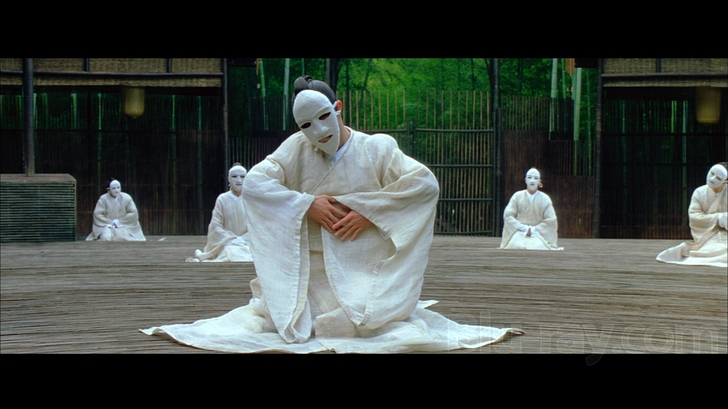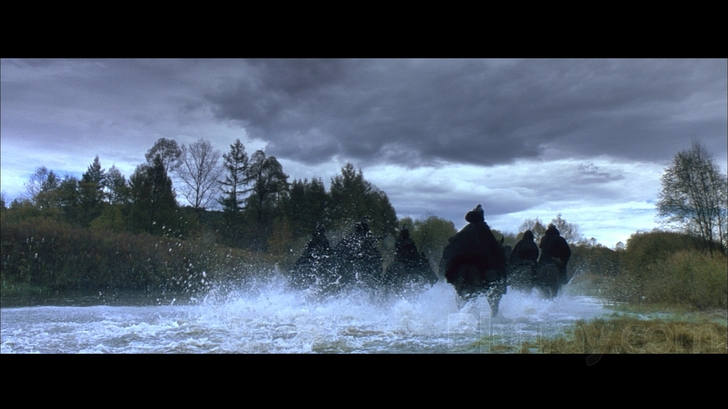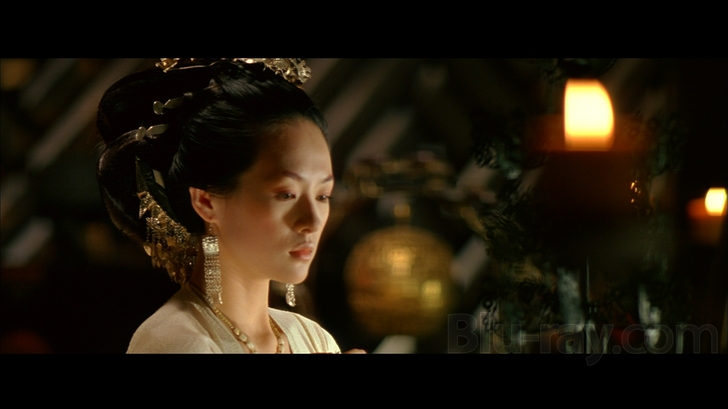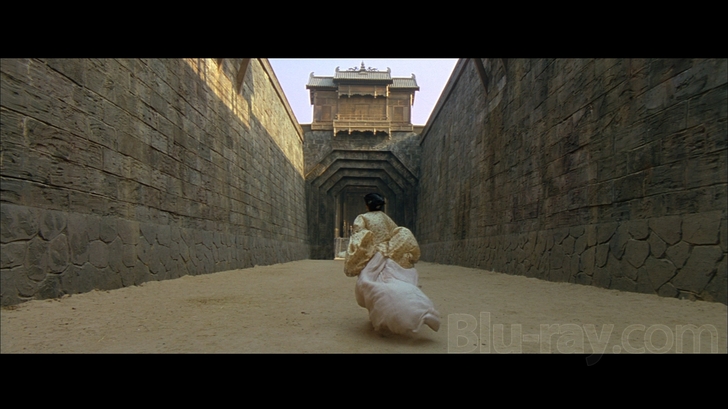Legend of the Black Scorpion Blu-ray Movie
HomeLegend of the Black Scorpion Blu-ray Movie 
夜宴 / The Banquet / Ye YanVivendi Visual Entertainment | 2006 | 131 min | Not rated | Oct 26, 2010
Movie rating
6.9 | / 10 |
Blu-ray rating
| Users | 4.2 | |
| Reviewer | 4.0 | |
| Overall | 4.1 |
Overview
Legend of the Black Scorpion (2006)
Ancient China - the Imperial Court. The emperor dies mysteriously. His death starts a journey of loyalty and betrayal, conspiracy and slaughter, and love and hatred a la Shakespeare's Hamlet.
Starring: You Ge, Daniel Wu, Xun Zhou, Jingwu Ma, Xiaoming HuangDirector: Feng Xiaogang
| Foreign | Uncertain |
| Martial arts | Uncertain |
| Action | Uncertain |
| Drama | Uncertain |
| History | Uncertain |
| War | Uncertain |
Specifications
Video
Video codec: MPEG-4 AVC
Video resolution: 1080p
Aspect ratio: 2.46:1
Original aspect ratio: 2.39:1
Audio
Mandarin: DTS-HD Master Audio 5.1
Mandarin: Dolby Digital 5.1
English: Dolby Digital 5.1
Subtitles
English SDH, Spanish
Discs
50GB Blu-ray Disc
Single disc (1 BD)
Playback
Region free
Review
Rating summary
| Movie | 4.0 | |
| Video | 4.0 | |
| Audio | 4.5 | |
| Extras | 3.0 | |
| Overall | 4.0 |
Legend of the Black Scorpion Blu-ray Movie Review
Wuxia or not wuxia, that is the question.
Reviewed by Jeffrey Kauffman October 25, 2010When Crouching Tiger, Hidden Dragon took the movie going world by storm in 2000, suddenly it was if the floodgates had been opened, and we were suddenly awash in films about feudal Asian times filled with wire dancing martial artists. Many, if not most, of these films usually get lumped together under the wuxia rubric, the Chinese fiction idiom dealing with martial arts, though a close reading of that term would really probably eliminate at least some of them. But anyone who’s seen Crouching Tiger, Hidden Dragon, or any of the many films which followed in its wake, pretty much knows what to expect going into one of these endeavors, whether or not it really fits into a strict definition of wuxia. Heroes and villains are more often than not extremely broadly drawn, sets (and set pieces) are often grandiose, and there is usually a very evocative use of location shooting in authentically Chinese locales like bamboo forests. And, of course, there’s the amazing fight choreography, with antagonists leaping, flying and otherwise defying gravity in a sort of giddy martial arts version of the dance sequences that used to litter classic Hollywood musicals. Legend of the Black Scorpion was originally titled The Banquet when it was released in 2006, and that in fact is probably a better title for it. Scorpion may have been retitled to trade on the popularity of its sort of sibling film, Curse of the Golden Dragon, a film which was actually released a couple of months after The Banquet, but which, for reasons probably best attributed to the vagaries of popular culture, took off stateside more than The Banquet initially did. (It’s interesting to note that Hong Kong submitted The Banquet as its nominee for the Best Foreign Language Film for the 2006 Oscars, while “mainland” China did the same for Golden Flower, but neither film ended up in the five finalist positions).

The Banquet and Golden Flower both defy traditional wuxia expectations in at least a couple of notable ways. Both films don’t really deal with an impoverished class fighting against a ruling elite. Instead, both films deal with palace intrigue within the ruling elite. And neither film really relies on huge wire-laden fight sequences, though each film certainly does feature that element. Both The Banquet and Golden Flower offer at times mind boggling production design, and indeed the main palace set for The Banquet was evidently the largest single set ever built for a Chinese film, according to commentator Bey Logan. What may really set The Banquet apart from most films of this ilk, however, is its source material. Like Golden Flower, The Banquet is based on a famous play. Unlike Golden Flower, whose source material was a 1930s effort probably little known outside of its native land, most people have probably heard of The Banquet’s inspiration: it’s a little piece called Hamlet by a guy named William Shakespeare.
In this reworking, our “melancholy Dane” is a young Chinese prince in the 10th century, Wu Luan (Daniel Lu). The film opens with a stunning sequence where Wu Luan, who has removed himself from all of the court intrigue after his childhood love is betrothed to his father, is engaging in a sort of ritual theatrical performance in a bamboo forest. Unlike Hamlet, Wu Luan doesn’t have a conniving mother. He instead has a conniving step-mother, Empress Wan (Ziyi Zhang), who is, of course, that childhood love kept from Wu Luan. It is at least hinted at that Wan and Wu Luan have had an intimate relationship at some point in their distant past. Wan has helped to murder her husband, Wu Luan’s father, and has taken up with the dead Emperor’s brother, Li (You Ge), who has assumed the emperor’s mantle and is planning an official wedding to his former sister-in-law. Since Wu Luan is the crown prince, Li plots to have him assassinated, so as to remove any chance of a usurper claiming rightful inheritance of the throne. Wu Luan manages to escape the killers who show up at the outdoor amphitheatre, in one of the film’s iconic set pieces, and returns to the palace to seek revenge.
The Banquet is thus considerably more complex than some wuxia outings, and that is nowhere more apparent than in the character of Empress Wan, whom Ziyi Zhang brings fully alive in an absolutely astounding performance. The audience is frequently unsure of exactly what to think of this character, and it plays into the subtle subterfuge which shadows most of this film. Is Wan a victim herself? Is she a devious murderess? Is she hopelessly in love with a young man who, through no fault of her own, ended up as her stepson? Is she also insanely jealous, out to make sure if she can’t have Wu Luan, no one can. In at least some measure, the answer to these questions is “all of the above.” Wan is one of the most devilishly complicated female characters to ever inhabit a wuxia, or even a quasi-wuxia, film, and she is certainly a much more convoluted offering than Gertrude in Hamlet is.
Much like Curse of the Golden Flower, The Banquet may be too slow moving for those who want their flying martial arts sequences fast and furious. But that very stately rhythm actually is one of The Banquet’s subtly effective mechanisms. The slow procession of courtly life seems calm on the surface, but just barely underneath passions and plots are roiling to calamitous conclusions. Director Feng Xiaogang, who prior to The Banquet was best known in China for his comedies, here stages an incredibly sumptuous film that brilliantly captures the pomp and circumstance of a long bygone age. Feng also handles his actors intelligently and with a great deal of restraint. While that may make some of the performances near ciphers (with or without attendant masks, which come into play), the surface stoicism again covers a tempestuous emotional undercurrent which is quietly palpable.
Two Oscar winners from Crouching Tiger, Hidden Dragon do exceptional work here on The Banquet, art director Timmy Yip and composer Tan Dun. Yip’s production design is nothing less than amazing, and though Dun doesn’t really exploit native instruments the way he has done in other scores of his, he provides a lush and compelling underscore. Fight director Yuen Woo-ping (The Matrix) contributes some brilliantly choreographed moments, especially the grand sequence at the theatre in the bamboo forest, which has a number of really amazing elements.
Shakespeare’s Romeo and Juliet contains the immortal line, “A rose by any other name would still smell as sweet.” Why American marketers chose to rebrand The Banquet as Legend of the Black Scorpion is anyone’s guess, but the good news is, by whatever title it’s know, it’s a compelling and very beautiful film. Give The Banquet time to work its devious spell on you, and you’ll come away thinking, “Though this be madness, yet there is method in’t.”
Legend of the Black Scorpion Blu-ray Movie, Video Quality 

While Curse of the Golden Flower may have the slight edge over The Banquet in sheer audacity of its production design, it's not much of an edge, and this Blu-ray's brilliant AVC encoded 1080p transfer (in 2.46:1) really exploits the mammoth ambitions of the filmmakers. From the arresting opening "mime" sequence in the bamboo forest, to the shadowy interiors of the Royal Palace, The Banquet is astoundingly colorful, but brushed with a sort of film analog to chiaroschuro, where the darks are very dark indeed, and the bright colors are mind bogglingly saturated. While this transfer may just be a tad softer than Golden Flower, close-ups reveal a wealth of extremely sharp detail. This is, along with Golden Flower, one of the most stupendous physical productions in recent Chinese film history, and the Blu-ray shows every glistening aspect of both sets and costumes. Contrast and black levels are exceptional, and fine detail is also excellent. The best part of this transfer is the lack of any significant artifacting, especially notable since usual suspects like chainmail and heavily leafed trees don't ever devolve into aliasing, shimmer or moire.
Legend of the Black Scorpion Blu-ray Movie, Audio Quality 

Despite the odd choice by Dragon Dynasty to have this Blu-ray default to a lossy Mandarin Dolby Digital 5.1 mix, rest assured there is indeed a lossless Mandarin track delivered in DTS-HD Master Audio 5.1, and quite an excellent lossless track it is. There are so many great little (and huge) moments in this track it's difficult to select just a few, but during the title sequence listen to the really fun little "pit a pat" of scampering scorpion feet, which clearly pan and are just so hilariously delicate, as the CGI beast makes its way from right to left and then stings a silk screen of a banquet. As might be expected, the fight scenes are a whirwind of surround activity, with the quicksilver high frequency of metal meeting metal zinging around the soundfield. Spears flung from unseen assailants whiz from side channel to side channel, piercing bamboo stalks with a nice sonic crush. Dialogue is very crisp and clear and there's precious little of the dubbing anomalies that seem to hamper a lot of the Dragon Dynasty releases. Tan Dun's evocative score is also brilliantly well mixed into the proceedings. Fidelity and dynamic range are spot on throughout.
Legend of the Black Scorpion Blu-ray Movie, Special Features and Extras 

Once again, the Commentary by Bey Logan is the best thing on this Dragon Dynasty Blu-ray in terms of the supplements. Logan is invariably interesting and informative, and this outing is no exception. Aside from Logan, two lengthy, but less interesting, Interviews are included: Master of Ceremonies: An Exclusive Interview with Director Feng Xiaogang (SD; 20:17), and Warrior Prince: An Exclusive Interview with Leading Man Daniel Wu (SD; 23:29). A Dynasty Uncovered: Behind the Scenes on 'Legend of the Black Scorpion' (SD; 41:40) has some great footage of fight scenes being staged, as well as a nice look at the mammoth sets the film employed. Two Theatrical Trailers round out the supplements.
Legend of the Black Scorpion Blu-ray Movie, Overall Score and Recommendation 

The Banquet is a fascinating feudal Chinese take on Hamlet, with enough changes to Shakespeare's basic outline to confound even those who know the Bard's version backwards and forwards. Filled with some stupendous set pieces, not to mention stupendous sets (and costumes), this film is anchored by a brilliant performance by Ziyi Zhang in one of the most complex female roles to ever make it into a quasi-wuxia offering. Highly recommended.
Similar titles
Similar titles you might also like

Curse of the Golden Flower
满城尽带黄金甲 / Man Cheng Jin Dai Huang Jin Jia
2006

An Empress and the Warriors
江山·美人
2008

The Warlords
Tau ming chong
2007

Seven Swords
七劍 / Qi jian
2005

The Assassins
Tóng Què Tái, 銅雀台
2012

Battle of the Warriors
墨攻 / Battle of Wits / Battle of Kingdoms
2006

Legend of the Fist: The Return of Chen Zhen
Jing mo fung wan: Chen Zhen
2010

Red Cliff: Part I & Part II
赤壁 / 赤壁:决战天下 | Chi Bi | Original International Version
2008

True Legend
Su Qi-Er
2010

Fearless
Huo Yuanjia | 霍元甲 | Theatrical, Unrated, & Director's Cuts
2006

Bodyguards and Assassins
十月围城
2009

Memories of the Sword
2015

Shadow
影
2018

War of the Arrows
Choi-jong-byeong-gi Hwal
2011

Once Upon a Time in China III
黃飛鴻之三獅王爭霸 / Wong fei hung III: Si wong jaang ba
1993

The 8 Diagram Pole Fighter
1984

Hapkido
合氣道 / He qi dao / Lady Kung Fu
1972

Wolf Warrior 2
Wolf Warriors 2 / Zhan lang II / Wolf Warrior II / 战狼II
2017

City of Life and Death
南京!南京! / Nanjing! Nanjing!
2009

The Grandmaster
一代宗師 / Yi dai zong shi
2013
